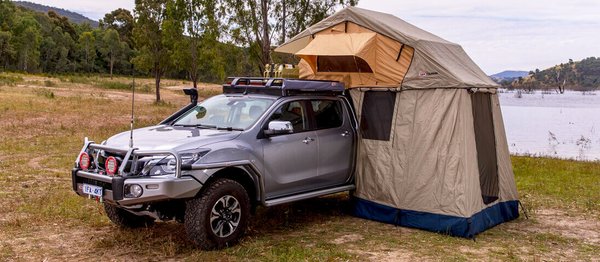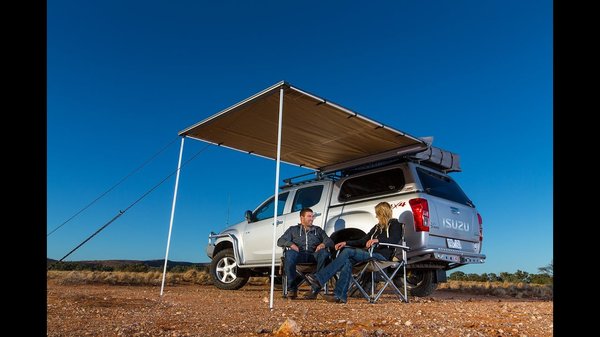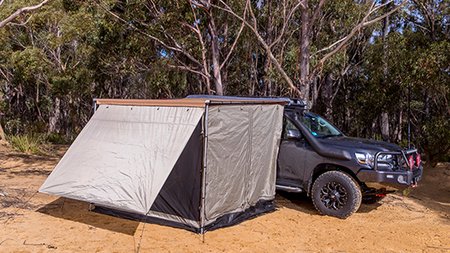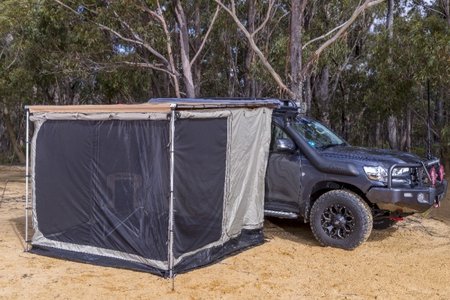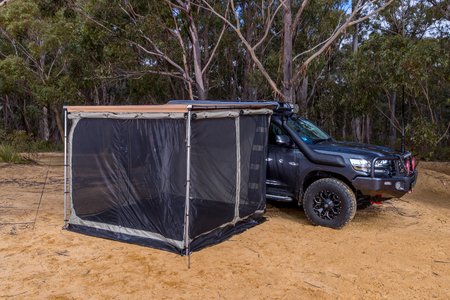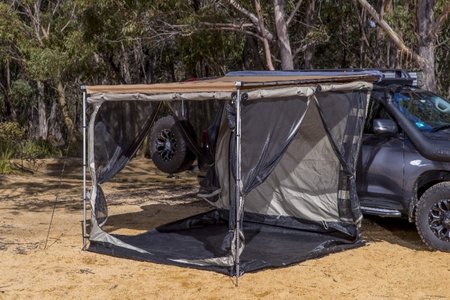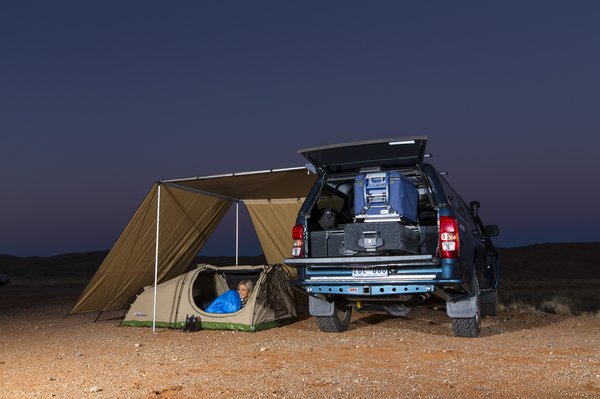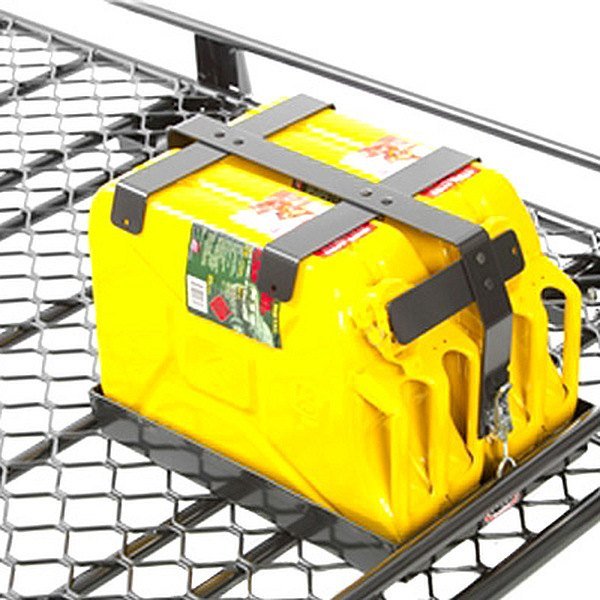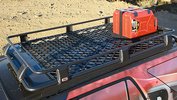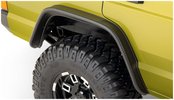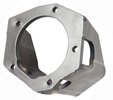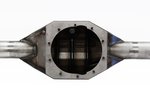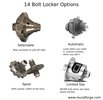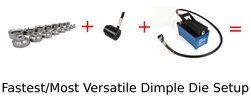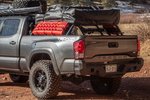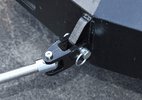35 ARB Roof Racks to Load Up for Adventure
ARB roof racks can be pretty difficult to decipher - there are several different types, sizes, and configurations.
It really shouldn't be so hard to figure out what is offered without doing a bunch of detective work.
So:
We've hunted down the various ARB roof rack models, plus we're going to break down the accessories that you can stick on your rack, like tents and awnings.
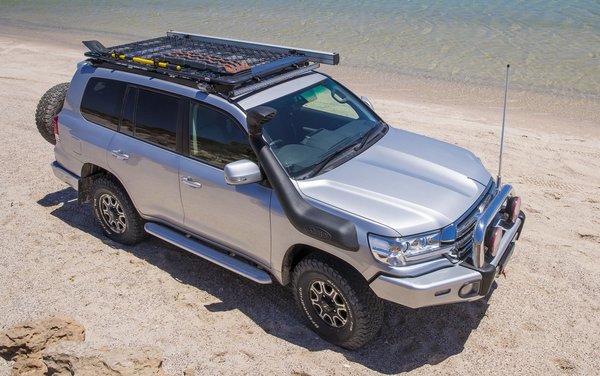
It's very easy to attach gear to the mesh floor.
For some crazy reason, it's difficult to find a consolidated listing of all the available ARB roof racks. We found about 35 different racks that vary according to:
- Size
- Material
- Mesh or bar floors
- Basket or flat design
If you're trying to pick a rack, this article can help you decipher the various designs.
If you already have an ARB rack and you want to switch to a different design, this is generally no problem as ARB roof racks are generally interchangeable. You can easily swap to a different length, or from a basket type to a flat-style. You need to make sure that the width of the new rack matches the width of the old rack.
Keep in mind that because of the way ARB designs their racks and mounts, you'll likely need to use a specific ARB rack width with a mount appropriate for your 4x4.
So, let's take a look at the various rack options:
The Big List of ARB Roof Racks
These are the 35 ARB roof racks that we could find. Read below if you want to find out about the differences. Much of it is self-explanatory, but we have some thoughts about why you might want to choose one option over another.
| Part Number | Length | Width | Style | Material | Floor | Links |
|---|---|---|---|---|---|---|
| 3813200 | 70.5” | 47.25” | Front Basket | Steel | Mesh | @Amazon, @4WheelParts |
| 3800030 | 43” | 49” | Flat | Steel | Bar | @Amazon, @4WheelParts |
| 3800180 | 53” | 49” | Flat | Steel | Bar | @Amazon, @4WheelParts |
| 3800190 | 73” | 44“ | Flat | Steel | Bar | @4WheelParts |
| 3800220 | 73” | 49“ | Flat | Steel | Bar | @4WheelParts |
| 3800230 | 87” | 44“ | Flat | Steel | Bar | @4WheelParts |
| 3800240 | 87” | 49“ | Flat | Steel | Bar | @4WheelParts |
| 3813030 | 70” | 44“ | Flat | Steel | Bar | |
| 3800030M | 43” | 49” | Flat | Steel | Mesh | @Amazon, @4WheelParts |
| 4900060M | 87” | 49” | Flat | Aluminum | Mesh | @4WheelParts |
| 4900070M | 87” | 44” | Flat | Aluminum | Mesh | @4WheelParts |
| 4913020M | 70” | 44” | Flat | Aluminum | Mesh | @4WheelParts |
| 3800010 | 87” | 49” | Basket | Steel | Bar | @Amazon, @4WheelParts |
| 3800013 | 87” | 49” | Basket | Steel | Bar | @4WheelParts |
| 3800020 | 73” | 49” | Basket | Steel | Bar | @Amazon, @4WheelParts |
| 3800040 | 87” | 44” | Basket | Steel | Bar | @Amazon, @4WheelParts |
| 3800050 | 72” | 44” | Basket | Steel | Bar | @Amazon, @4WheelParts |
| 3800060 | 43” | 44” | Basket | Steel | Bar | @4WheelParts |
| 3800120 | 43” | 53” | Basket | Steel | Bar | @Amazon, @4WheelParts |
| 3800130 | 118” | 53” | Basket | Steel | Bar | @4WheelParts |
| 3800160 | 40” | 49” | Basket | Steel | Bar | @Amazon, @4WheelParts |
| 3800200 | 87” | 49” | Basket | Steel | Bar | @Amazon, @4WheelParts |
| 3800250 | 52” | 44” | Basket | Steel | Bar | @Amazon, @4WheelParts |
| 3813010 | 70” | 45” | Basket | Steel | Bar | @Amazon, @4WheelParts |
| 3800010M | 87” | 49” | Basket | Steel | Mesh | @Amazon, @4WheelParts |
| 3800020M | 73” | 49” | Basket | Steel | Mesh | @Amazon, @4WheelParts |
| 3800040M | 87” | 44” | Basket | Steel | Mesh | @Amazon, @4WheelParts |
| 3800050M | 72” | 44” | Basket | Steel | Mesh | @Amazon, @4WheelParts |
| 3800100M | 87” | 49” | Basket | Steel | Mesh | @4WheelParts |
| 3800120M | 43” | 53” | Basket | Steel | Mesh | @4WheelParts |
| 3813010M | 70” | 45” | Basket | Steel | Mesh | @Amazon, @4WheelParts |
| 3813020M | 44” | 44” | Basket | Steel | Mesh | @4WheelParts |
| 4900010M | 87” | 49” | Basket | Aluminum | Mesh | @Amazon |
| 4900040M | 87” | 44” | Basket | Aluminum | Mesh | @Amazon, @4WheelParts |
| 4913010M | 70” | 44” | Basket | Aluminum | Mesh | @Amazon, @4WheelParts |
ARB Roof Rack Configurations
ARB roof racks come in a variety of configurations for whatever you want to do. Their newest racks are different from their older racks, but we'll discuss those differences ahead.
ARB Roof Rack Length and Width
| Width |
|---|
| 44" |
| 45" |
| 47.25" |
| 49" |
| 53" |
First, let's talk about width:
If there is one thing you need to know about the width of ARB roof racks, it's that you'll need to pick a width that corresponds to the width of your 4x4.
ARB is pretty specific on which widths will fit which vehicle. Their mount kits are specifically designed to work with specific vehicles to match up to a specific width.
Once you know the rack width that you need, you can pick just about any ARB roof rack that has that width, given that the rack isn't too long for your roof.
| Lengths |
|---|
| 40" |
| 43" |
| 44" |
| 52" |
| 53" |
| 70" |
| 70.5" |
| 72" |
| 73" |
| 87" |
Now, let's talk about length:
You essentially have two options with your rack length:
- Full-length: This covers you most of your 4x4's roof.
- Partial length: These racks usually run around 50-60% of the length of a full-length rack.
Full length racks are suitable for 4x4s that will use a roof top tent or just need the extra length. Partial length roof racks are generally used for vehicles like a Toyota Tacoma 4-door.
You can still easily run a partial length roof rack on an SUV.
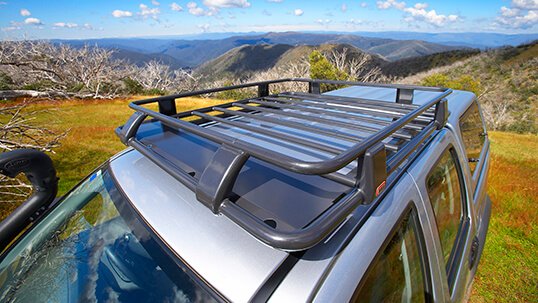
If you need a short roof rack to fit the roof or cap of a 4 door pickup, look for a "cab" version.
Materials: Steel Vs. Aluminum
It used to be that ARB roof racks were steel only.
As you might imagine, this makes you roof rack extremely heavy - some of the previous generations of typical steel ARB roof racks weigh as much as 120 lbs!
ARB's now sells roof racks in aluminum OR steel. The aluminum racks have the same weight rating as the steel racks, but are significantly lighter.
As with most things aluminum, ARB's alloy aluminum racks are more expensive than the steel racks. This is because aluminum is more expensive as a raw material and it's slightly more costly to fabricate stuff with it.
Should you go with aluminum?
As it stands, there are far fewer ARB alloy aluminum roof racks than steel ones. You might not have an aluminum option!
You might also be concerned about rust, but ARB generally uses high quality finishes that aren't going to wear away quickly. While an unmaintained steel roof rack will eventually rust, an aluminum rack can end up with ugly oxidation once the powdercoat is rubbed off. For us corrosion isn't a deciding factor in steel vs. aluminum.
Weight is:
4x4s that are top heavy handle differently than stock and are a little less stable - especially when that weight is high on your roof. A heavy rack is also harder to install and remove by yourself unless you have a garage with a dedicated de-roof-racking system.
Finally, you have fewer options if you want an aluminum roof rack. They are pretty new and there are only six available - three basket-style and three flat-style. All of them have a mesh floor.
| Aluminum | Steel | |
|---|---|---|
| Cost | Cost more | Cost less |
| Weight | Low | High |
| Corrosion-resistance | Won't rust, may oxidize if worn | Will eventually rust |
| Available options | Only 6 racks currently offered in alloy | 29 racks offered in steel |
ARB Roof Racks with Mesh vs. No Mesh
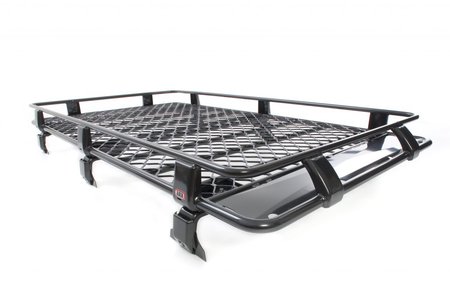
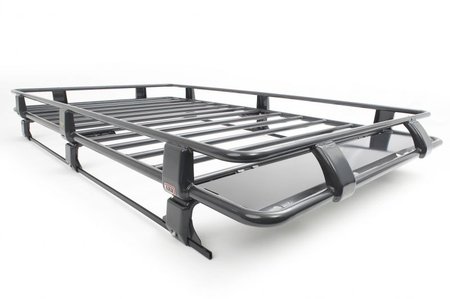
The expanded mesh floor is the newest offering from ARB.
ARB roof racks come with either a mesh floor or a bar floor. This is pretty self explanatory, and, for most people, this is a matter of personal preference.
It's probably a little easier to lash gear down with a bar floor - the open bars are easy to hook to with straps.
It's probably easier to deal with rooftop tents and smaller items with a mesh floor.
15 ARB roof racks come with a mesh floor. 20 ARB roof racks come with a bar floor. If you're looking at part numbers, the mesh floor variants have an "M" on the end.
So:
- 3800010 is a bar-floor basket roof rack.
- 3800010M is a mesh-floor basket roof rack. It is the same size, they are both baskets, and they are both steel.
Not all ARB roof racks have both a mesh and bar variant - some are only one or the other.
There is another style of mesh:
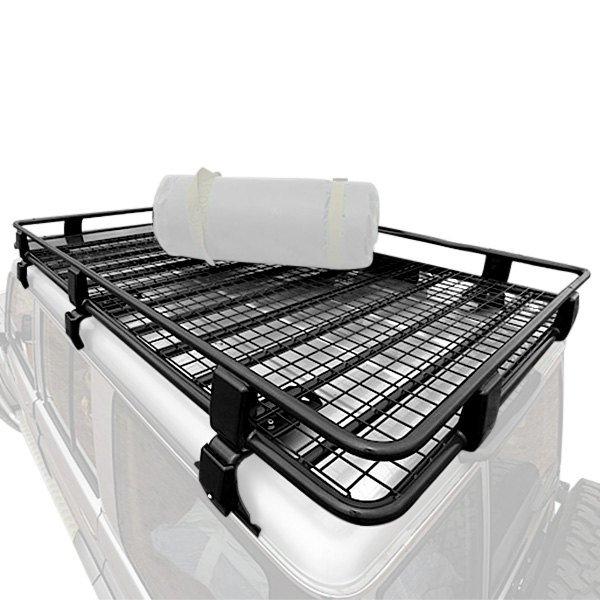
The grid mesh floor is generally an older style. Still works great and some people might prefer the perpendicular grid.
Older racks have a grid-style mesh, not expanded metal. Nothing wrong with it, and some people might prefer it.
Basket vs. Flat Roof Racks
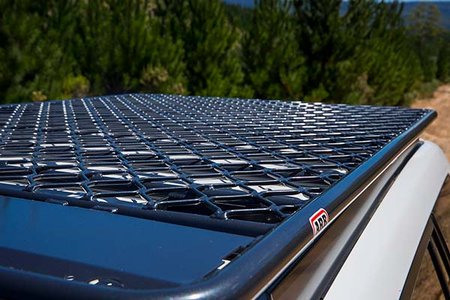
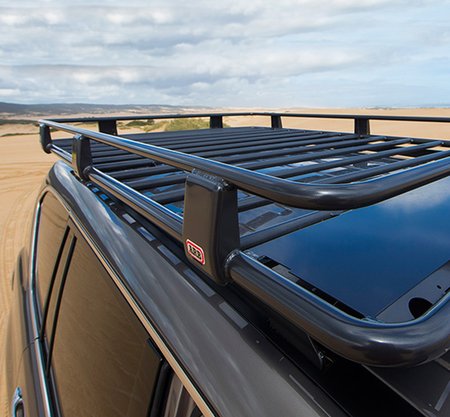
These flat racks are very low profile. They should cut down the wind noise and decrease weight compared to the basket-style racks.
Lastly, some ARB roof racks are baskets and some are flat.
With the rise in the use of rooftop tents, it's no surprise that ARB is making lots more flat racks that better accommodate using a rooftop tent.
Flat racks are easier to load, easier to mount to your 4x4's roof, and are lighter than a comparable basket rack.
On the other hand:
With a basket rack, you don't need to work quite as much about whether gear is properly secured and the side rails make easy lashing points. You can still use a rooftop tent or attach a number of accessories to them.
Basket racks also have one unique benefit that we're fond of if your cruising around the backcountry in an SUV:
You can collect firewood and throw it in your basket rack on the way to camp. We only do this on slow trails with low traffic, and it makes it easy for a passenger to jump out, grab some small logs, and jump back in. No bark in your rig and ensures you have firewood in campsites that have been stripped of firewood.
The Third Option
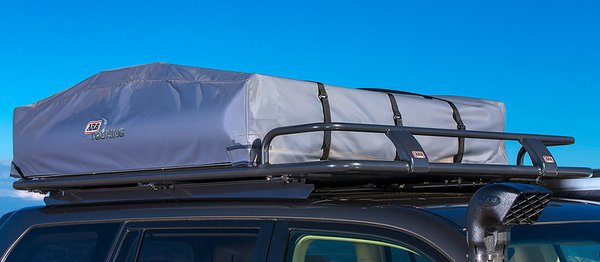
This rack combines a front basket, with convenient tie down bars, and a flat rear section, for mounting a tent.
ARB also offers a "Touring" rack in 70.5" x 47.25". This rack has a basket front for stowing gear, and a flat back for attaching a tent. We like the idea, but they don't offer this rack in enough sizes for it to be very useful.
Mounting stuff
Whether you have a basket or flat ARB rack, you can figure out how to mount anything to it - off that we're sure! We don't have a preference for either rack in particular, but consider some thoughts about mounting accessories to your rack:
Imagine a minimal day-tripping 4x4 loadout of:
- Hi-Lift Jack
- Shovel
- Maxtraxx
With a basket rack, these accessories are usually mounted to the side bars, usually in the same plane as the rack's side bars. Because of this:
- The main cargo area of the rack is clear.
- These accessories are mounted higher, which means that they may be slightly out of reach, will be less aerodynamic, and may catch on low-hanging branches.
With a flat rack, these accessories are usually mounted to the side bars OR flat on the rack. With a flat mounting:
- The main cargo area of the rack is occupied by your accessories.
- The accessories are lower, but may still be out of reach if mounted towards the center of your rig.
- The accessories are more aerodynamic and won't catch on low-hanging branches.
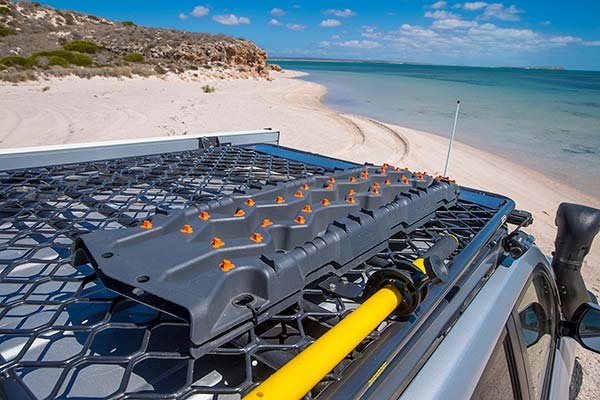
Flat-mounting accessories keeps them out of the way on tight trails.
If you plan to use ARB's roof rack for more than just off road adventures, you may want to think about what it will be like to load and tie down other things, like:
- a ladder
- a sheet of plywood
- mountain bikes
- canoes/kayaks
And don't forget noise:
Wind noise is a problem with anything that you put on your roof. We're talking about it separately because it can be a real pain! If you drive with a roof rack on your rig at highway speeds, you'll experience a lot of wind noise.
This is particularly bad with a basket-style rack, whether it's ARB or any other brand. ARB makes wind deflectors to cut down on noise and we'd consider them a must-have if you're going to be hitting the interstate.
The deflectors are currently available in 44" wide and 49" wide.
You always have the option of taking off your rack, but we find that this is the sort of thing you always intend to do, but never get around to actually doing.
ARB does NOT provide deflectors with their flat racks. The flat racks are not as noisy as the basket, but they still produce wind noise. If you like driving with your sunroof open, some amount of noise is going to be inevitable.
ARB Roof Rack Accessories
Let's take a look at a few accessories you can stick on your ARB roof rack.
We have a preference for putting lighter things on the roof rack. We prefer dense, heavy items to be stowed lighter on the 4x4 to get better handling and for less effortful use.
ARB Rooftop Tent
This tent mounts on any roof rack. The annex gives you a little extra privacy. We often see these paired with an awning on the other side of the 4x4.
Rooftop tents are a whole other beast, but let's point out a few things regarding ARB's roof racks and ARB's rooftop tents.
ARB's primary tent offering right now is the Simpson III Rooftop Tent and Annex Combo.
This is a complete tent assembly that includes:
- The tent
- A tent cover (for when it's folded and stored)
- Mounting hardware
- The rooftop tent ladder
- An "annex" that zips under the tent and provides a private "stand-up" area
ARB has a great reputation for high quality gear. Should you buy this thing? Maybe, but that's not what this article is about.
Which rooftop tent fits my rack?
However, you should know:
You can use any rooftop tent on any ARB rack, it doesn't need to be an ARB tent. Also, you can put an ARB rooftop tent on any roof rack. Again, it does not need to be an ARB rack.
If you're planning to use a rooftop tent, we like the idea of using a ARB's flat roof rack. It locates the tent a little lower which means:
- The lower height is less likely to catch on branches and brush on the trail.
- It's easier to reach from the ground during assembly/dissassembly.
- It's a little easier to install and uninstall.
- It's easier to reach from nerf bars/rock sliders/side steps. This is helpful because there are assembly steps (assembling window struts, hooking/unhooking clasps, etc.) that require you to reach across your 4x4's roof when putting up a rooftop tent.
ARB's rooftop tents, like all rooftop tents, come with a ladder. The ladder attaches to the tent and is used to help you put up and take down the tent.
Rooftop tent ladder tips
You may find that the feet of the ladder slip on smooth surfaces. At least in the US, we have lots of campgrounds where you might have to set up on a concrete pad. Pretty frequently, you'll find that smooth concrete or pavement, combined with a bad angle on the ladder will make the ladder feet slip.
If the ladder's feet slip, we think the best solution is to drill a few more holes in the ladder to allow for more adjustment positions. This lets you adjust the ladder's height and angle to a greater degree. Make sure you do this before you're at a campsite.
This isn't a problem on all 4x4's, and has a lot to do with the overall height of your tent.
Another quick tip:
ARB sells a rooftop tent ladder extension. If you setup in awkward dispersed areas or have a tall rig, this will ensure that your ladder reaches the ground!
ARB Awning
The standard ARB awning will provide shade and protection from rain. Amazing for long trips or picnicking!
If there is one thing we've come to love, love, love on an extended camping trip, it's an awning!
This is probably one roof rack accessory that we'd recommend to just about anybody.
Why?
- Awnings provide protection from the sun.
- Awnings provide protection from rain and snow.
- Awnings can be turned into private "rooms".
- Awnings are great for camping or even just spending a day out picnicking somewhere.
Why you should get a roof rack awning
The ARB awning room is highly configurable, which is what makes it so versatile in so many different conditions.
Still blocks the sun and the mosquitoes like this!
Imagine that you're traveling along the Oregon Coast and camping in state forests, where dispersed camping is allowed. You're on the lookout for a campsite and you finally find one nestled in the trees. Being the Oregon coast, it's a little wet and drizzly. However, you and your partner would like to stretch your legs, set out your camp chairs, and enjoy a fire for the rest of the evening.
While you could sit out in your rain gear in a slight drizzle, you could also sit under your ARB awning and have a little protection! It's easier to relax around camp, cook, eat, read, stretch out. Plus your stuff doesn't get wet like it does when you're shuffling stuff around in your 4x4 to find your noodles or a headlamp.
Go full mesh when you want to keep out the mosquitoes and keep ventilated.
Tie back the mosquito netting during the day (often when bugs aren't a problem) and redeploy it at night!
We've had many experiences where we were either extremely happy to have
an awning (midday in the Texas desert), or wished we had one (camping
under trees infested with gypsy moths on Cape Cod).
For most people that want to adventure outside with a vehicle, this is one of the greatest bangs-for-the-buck you can get.
ARB awning specs and accessories
Windbreaks can be added to your awning to keep out wind and blowing precipitation.
Whether you sleep in a ground tent, a rooftop tent, or in your 4x4, an awning immediately provides you with a larger livable area.
We're not going to list all the ARB awnings, but there are a few variations that are interesting:
- Comes in 98" x 98", 79" x 98", and 49" x 83". First number is the length that will attach to your rack.
- You can buy an awning room with mosquito netting, solid sides, and a floor for the 98" x 98" and for the 79" x 98".
- You can buy a windbreak and skip the awning room.
- All of the awnings have an LED strip light kit.
Out of all the upgrades you can make to your overlanding rig, an awning is one of the best.
Check out awnings here:
ARB Roof Rack Fuel and Water Can Holder
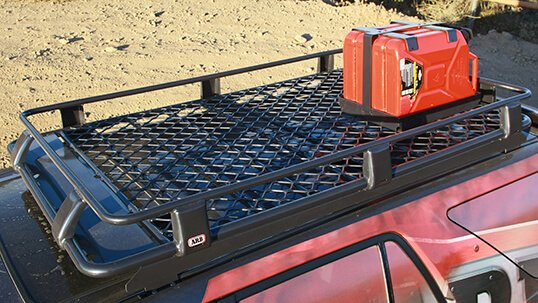
ARB's roof rack jerry can holder does exactly what it says - holds jerry cans!
The holder takes 2 cans. ARB specifies that you need to use metal jerry cans. You should be using red cans for gasoline and yellow for diesel. You'll see blue cans in the wild - these are usually used for kerosene.
These are typical painted steel jerry cans that would fit this can holder:
Should you even be using jerry cans on your roof rack?
While we like lots of options for mounting stuff, the roof is not usually our first choice for fluids.
Why?
Weight. A steel NATO jerry can weighs 9.5 lbs and holds 5.3 gallons of liquid. Take a look at how much weight this will add to the top of your 4x4:
| Gasoline | Diesel | Water | |
|---|---|---|---|
| Weight/gallon | 6.3 lbs | 7.0 lbs | 8.3 lbs |
| Weight of one jerry can with liquid | 42.6 lbs | 46.6 lbs | 53.7 lbs |
| Weight of two jerry cans with liquid | 75.8 lbs | 83.7 lbs | 97.9 lbs |
| Weight of three jerry cans with liquid | 108.9 lbs | 120.8 lbs | 142.1 lbs |
| Weight of four jerry cans with liquid | 142.0 lbs | 157.9 lbs | 186.3 lbs |
| Weight of five jerry cans with liquid | 175.1 lbs | 195.0 lbs | 230.5 lbs |
| Weight of six jerry cans with liquid | 208.3 lbs | 232.1 lbs | 274.7 lbs |
Yikes!
Every time you need to load or unload these liquids, you'll need to heft them to and from your rack. At least with water, you can advantageously use the height of the rack to get you a gravity feed from your jerry can for in-camp activities.
There are certain circumstances where having fuel on the rack is necessary, but we'd prefer putting it on a swing-out tire carrier or even an auxiliary tank.
ARB Roof Rack Hi-Lift Jack and Shovel Holder
We absolutely consider some type of off road shovel to be a necessity on any overlanding/4x4 trip. We've got two primary uses:
- Getting unstuck: A shovel is just a standard recovery item that helps lessen the strain on your winch and fills holes that you've Hi-Lifted a wheel out of.
- Digging campfire holes: In truly primitive sites without fire rings, we dig a small fire pit and fill it in when we leave after dousing it with water. This isn't quite Leave-No-Trace but it's a lot less impact than leaving a heap of ash and blackened coals (which is unfortunately a typical practice).
We also consider a Hi-Lift Jack to be an essential piece of recovery gear.
We've seen some debate about both the necessity and the danger of Hi-Lifts, but that's a bunch of BS. If you're solo, the Hi-Lift is probably equally as valuable as a winch. We've used it again and again, on vehicles with winches and without, for breaking mud suction or freeing the tire of an axle that's been high-centered. Get one, learn to use it safely, and respect it.
All that said, where do you store these things?
Shovels and Hi-Lifts are long and a real pain to store in your rig. You don't want them rolling around unsecured.
That's where the ARB shovel and Hi-Lift mount comes in. It secures to your rack so you never have to think about where they are.
Now:
While outside our rig is where we prefer to store the Hi-Lift, there is one serious downside to this: the climbing pins will eventually rust and jam. We deal with this in 3 ways:
- Keep a can of lube to squirt the pins on use (this is a good practice anyway)
- Keep a Hi-Lift Repair Kit handy - this kit is cheap and has spare climbing pins
- Put a cover on your Hi-Lift
Last updated: March 26, 2020
